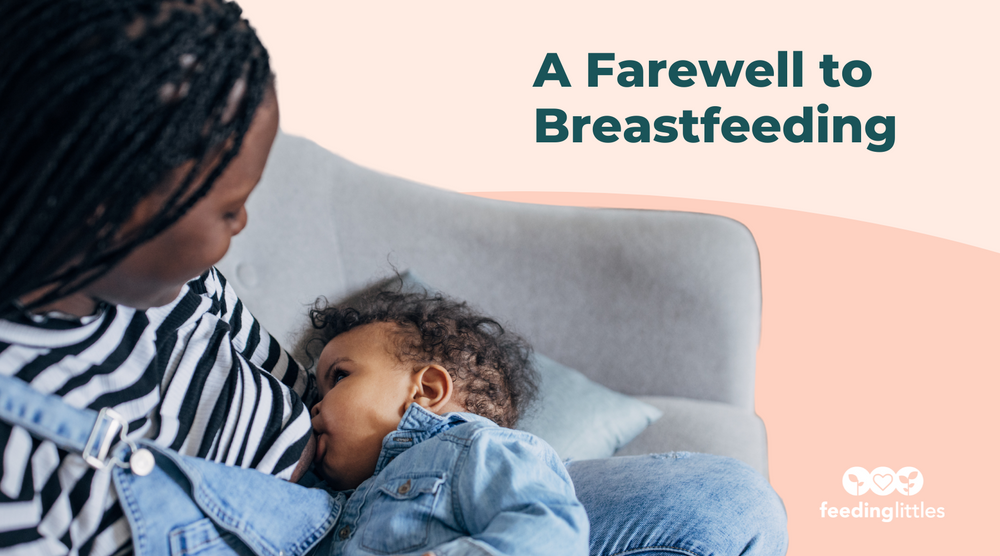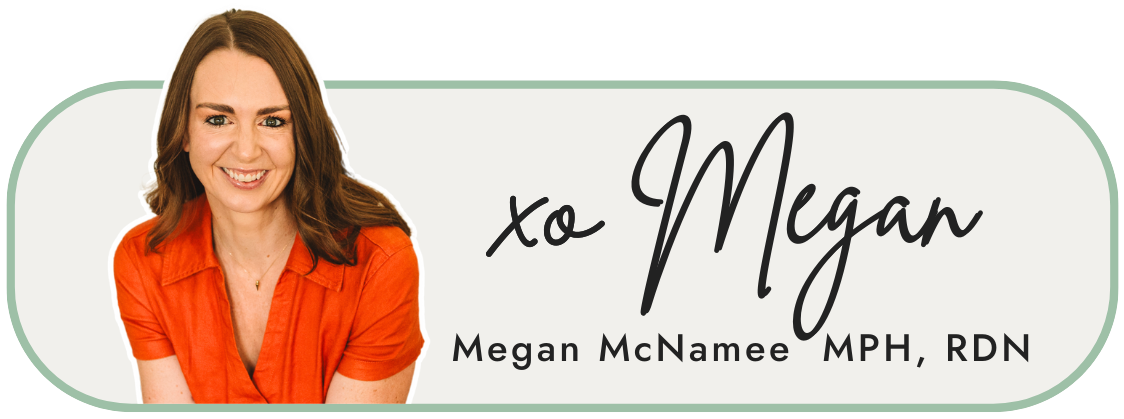
Originally written in October 2017 by Megan, dietitian and co-founder of Feeding Littles.
I have breastfed for over 52 months. Fifty. Two. Months. Looking back, it flew by. I hardly remember nursing my first baby, and now I’m about to wean my second. In fact, her last day breastfeeding will be tomorrow, the day before I leave for a trip. She will have nursed (nearly) every day for the last 2 years.
Breastfeeding is one of the most emotionally-charged topics of motherhood. It is a joyous experience for some, an impossible one for others. Some women love it. Others hate it. Many women who were unable to breastfeed harbor guilt and hard feelings about the whole experience.
This is not a post about breastfeeding being better than bottle feeding or why everyone “should” breastfeed. I am a believer in feeding your baby in a way that works best for mom, baby and the whole family, recognizing also that some families don’t have a mom. I have loved breastfeeding my babies and I feel lucky that I was able to do it, but as a dietitian I am well aware that breastfeeding just doesn’t work for everyone, for a variety of reasons.
If thinking about breastfeeding hurts your heart, please know that I am sending you a virtual hug and that I am proud of you for figuring out what works better for you and for baby. Sometimes feeding issues teach us the first of many hard parenting lessons – we are not always in control.
I want to share some of my personal thoughts and recommendations about breastfeeding, as my experience – like every mom’s – is a bit unique. I hope that in reading this you learn something new, can relate to something you’ve experienced, or find healing in your own story. Of course, this post could be much, much longer than it is. I am not an IBCLC and I know many of these topics could be greatly expanded upon, so I hope you find the help and support you need if you’re struggling.
Get educated. Breastfeeding seems easy – what do you need besides boobs and a baby, right? Most of us haven’t grown up surrounded by breastfeeding. Many of us were not breastfed ourselves, so we don’t have a tribe of women ready and able to teach us what to do. Both my mom and my mother-in-law breastfed, but this isn’t always the case.
Some aspects of breastfeeding aren’t logical, either. I’ve had clients who think that feeding a baby less often – when their breasts seem fuller – is the best way to get baby more milk. As you may know, feeding infrequently can hinder your milk supply because baby is removing less milk overall and not telling your body to produce even more.
Those first few days after birth are critical in establishing your milk supply and learning what breastfeeding is all about. Read about it before having baby, or better yet – take a class. Many hospitals, birthing centers, and breastfeeding support groups have breastfeeding education classes. If you’re local to Phoenix, check out Modern Milk or Babymoon Inn to learn all about breastfeeding before baby arrives.
Keep your eyes on the prize. Feeding your baby in the early weeks and months is very overwhelming because it’s ’round the clock. I felt like I went from an independent woman to a mom tethered to a baby, literally overnight. My babies never liked bottles, so it was even more overwhelming to be their only food source. (If you have a bottle-refusing baby, we have a post for you!)
Take it one day at a time, friend. Make a goal of 1 week, then 2, then 1 month. If you can get to 6 weeks you’ve likely gotten over many breastfeeding humps.
Believe it or not, once you figure out breastfeeding, it can be much, much easier than pumping or bottle feeding. In fact, one reason why I continued to breastfeed into toddlerhood is because it was easier than weaning (true story). You don’t need special equipment or gear when baby is with you. No washing or heating bottles, no cleaning, no worrying about sanitizing equipment.
Remember that this is a temporary time in your life. It will be all done before you know it (insert sobbing here).
Find an IBCLC, especially one trained in understanding tongue and lip ties. If you have issues breastfeeding, a consult with an IBCLC is the best money you can spend. Seriously. International Board Certified Lactation Consultants are God’s gift to new moms, and many are even covered by insurance. WIC employs IBCLCs as well. If something seems wrong, trust your gut and get help. I promise you won’t regret talking to a pro.
I could not have breastfed without the help from Amey Clark, and there are so many wonderful IBCLCs (including Stephanie Nguyen) who are willing and able to help you navigate this new world of feeding your baby.
Both of my babies were severely tongue and lip tied, and it takes a trained practitioner to identify and revise these ties. Make sure your providers know how to revise – or who to refer to for revision. If your provider doesn’t acknowledge tongue ties but breastfeeding isn’t going well, consider getting a second opinion.
Above all else, keep seeking help if you’re not getting the support you need. There’s someone out there who can help you make breastfeeding successful – or at least understand when it’s time to switch to another feeding modality.
If you use a breastfeeding pillow, bring it on trips. It’s so much easier to nurse a young baby with a pillow if that’s what you’re used to. I brought my Boppy everywhere when we traveled. It’s helpful on the plane and is critical at your final destination. Plus, you can wash it when you get home!
If you don’t respond to a traditional electric pump, try a manual pump or hand expressing. I was a breastfeeding unicorn in that I could never pump much milk but could hand express 5-8 ounces of milk at a time. (I had massive over-supply. Normal pump output when breastfeeding full-time is 0.5-2 oz between both breasts.) It was a little freakish. For some reason, I never did well with an electric pump. I have friends who did much better with manual pumps instead of an electric pump too. Don’t get discouraged if pumping isn’t working – try other options! Your IBCLC can help you with this.
Don’t cover – or do. Basically, do what makes you feel comfortable. I always applauded moms who nursed without covers, but I personally didn’t feel comfortable doing it with my uber-distracted babies (who whipped their heads around at any slight noise as they nursed). The cover actually kept them focused as they nursed.
I did master breastfeeding in the Ergo uncovered, and that was a great option while grocery shopping or traveling. I think the baby’s height, mom’s torso length, and mom’s breast size all influence how well upright nursing in an Ergo or other carrier works, but it’s worth a shot. (I even nursed in a carrier while teaching classes at Babymoon and Modern Milk – talk about redefining working mom, right!?)
Don’t feel pressured to stop breastfeeding at age 1. Breast milk has an important role for toddlers too – it helps fill their nutritional gaps and can provide extra immune protection as they become more mobile (and more adventurous with what they touch). The World Health Organization and now the AAP recommend breastfeeding until at least age 2 – it’s not uncommon for women across the world to breastfeed until 3 to 5 years of age.
Do what works best for you. If you want to stop, by all means stop! My goal with both girls was 2, and with my first I stopped at 28 months – I was 5 months pregnant and didn’t want to tandem nurse! My second is only breastfeeding once a day but is pulling back hard as she nurses, which really hurts. That’s one reason why she will be done right after her 2nd birthday.
Take pictures and videos of your baby breastfeeding. I know this seems silly, and you don’t ever need to show these to anyone (although I think they’re absolutely beautiful, so show me!), but I think breastfeeding photos are some of my most cherished keepsakes. I treasure the professional ones from Jenn Hydeman, and I also love the ones I took myself in those sweet, quiet moments.
Cherish your time with baby when you can. Breastfeeding forced me to sit down, slow down, and focus on my sweet little infant (or toddler). Both girls have had fun routines and quirks around breastfeeding that I will never forget. My eldest loved saying, “Switch sides!” and I adored that my youngest would demand, “Light OFF!” and smile as she got ready for her naptime routine. I loved how breastfeeding seemed to solve all infant problems. I loved hearing my girls exhale a quivering sigh as they settled into their feeding rhythm, or make small coo’s as they relaxed and started to fall asleep. I loved the lip shake they made as they stayed latched for comfort, or the sweet gummy smiles they gave me as milk poured out of their toothless mouths. The sound of a breastfeeding baby is magical. It literally makes my uterus hurt to think about it.
I don’t know if I will miss breastfeeding as much as I will miss what it meant – peaceful time with my babies, where there was nothing more important in the world than being there together. I will always be grateful that my breastfeeding experience was a good one (despite tongue/lip ties, clogged ducts, mastitis and thrush). I don’t remember the hard parts – I remember the good stuff.
Remember that breastfeeding is successful only when it works for both mom and baby. There is much more to feeding and being a good parent than the type of milk baby gets. Give yourself grace to do what works for you and your baby, whatever that may be. I wish you joy and peace on your feeding journey. Never forget that you are an amazing parent, and your baby was perfectly designed to be yours!
